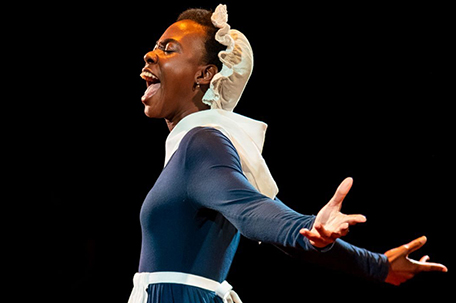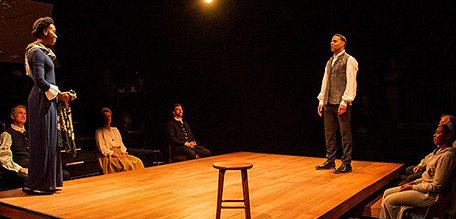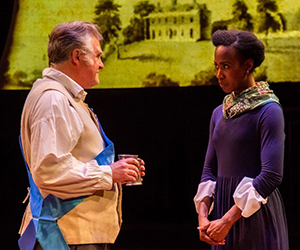
ABOVE PHOTO: Asia Rogers as Phillis Wheatley. (Photos by Linda Johnson)
By Constance Garcia-Barrio
Phillis Wheatley (c. 1753-1784), the first Black female poet published in America, got a bad rap, according to playwright Paul Oakley Stovall, principal author and artistic director of “Written by Phillis,” a play now appearing on stage in its world premiere at the Sedgwick Theatre, located at 7137 Germantown Avenue in Mt. Airy.
Marilyn Campbell Lowe co-wrote the play. Wheatley broke literary ground with her work, and that pioneering position set her up for criticism, Stovall said.
The play opens as a graduate student who must write a paper on Phillis, struggles to find her way into the topic. Once the student connects with her subject, Phillis’s life unfolds at the point where John Hancock and other Boston ‘big wigs’ grill her about the Bible, Greek and Roman mythology, and other subjects before they sign a statement to a London printer and bookseller, affirming that they “verily believe” that Phillis wrote the book of poems he’s considering publishing; the printer required their assurance before he proceeded. Phillis aced the men’s interrogation, and in 1773, her book, “Poems on Various, Subjects Religious and Moral” is published. At the age of 20, she became a celebrity.
Maybe the powerful Bostonians who questioned Phillis couldn’t fathom the change in her. Kidnapped from Gambia, the future poet reached Boston in July of 1761 on the slave ship Phillis, who she was named after. She was seven or eight at the time, according to Maryann N. Weidt, author of “Revolutionary Poet: A Story about Phillis Wheatley.” Due to Phillis’s sickly appearance — she suffered from asthma all her life — the well-off Wheatleys, a family that dealt in real estate and other businesses, bought her at a bargain price, according to Weidt.
Phillis soon demonstrated her genius.
“Within 16 months of arriving in the [American] colonies as a child, she’d mastered the English language,” said Rutgers University professor Erica Armstrong Dunbar in an interview. “This is at a moment in which most people couldn’t read or write…”

An apt pupil, Phillis also learned ancient Greek and Latin from Susanna Wheatley, the family matriarch. In a few years, Phillis blossomed into a poet. A week after a well-known clergyman died, the Massachusetts Spy newspaper advertised, “…for sale ‘An Elegiac Poem, on the Death of the Celebrated Divine,’ by PHILLIS, a Servant girl of 17 years of Age…Belonging to Mr. John Wheatley, but 9 years in this Country from Africa.”
Phillis’s publications and fame came about largely through Susanna Wheatley’s efforts. One of Susanna’s acquaintances in England, the Countess of Huntingdon, backed the publication of Phillis’s book. The countess insisted that “a picture of Phillis must appear in the front of the book.” Thus, the iconic image of Phillis wearing a mobcap and with quill in hand, was created when Scipio Moorhead of Boston, an enslaved poet and artist, did a pen-and-ink drawing of her.
In “Written by Phillis,” Stovall looks at other critical moments in the poet’s life. In April 1773, Susanna Wheatley wrote to the Countess of Huntingdon that “Phillis being in ..poor Health, the Physicians advise …sea air.” The Wheatleys decided that to improve her health Phillis would accompany their son Nathaniel on a business trip to England. Once there, Phillis met influential people, including Benjamin Franklin, who was on a diplomatic mission for the colonies. Phillis, who could have claimed her freedom in England, was to have an audience with King George III himself, but word came that Susanna Wheatley had fallen gravely ill. In the play, Black friends urged Phillis to seize her freedom, remain in England and see the king rather than go back to Susanna. The scene reveals Phillis’s relationship with Susanna.
Phillis lived in Boston during the tumult of the Revolutionary War (1775-1783). In October of 1775, she wrote to General George Washington, camped across the Charles River in Cambridge, and applauded his efforts to oust British troops from the area. She enclosed a poem with her letter:
Proceed great chief with virtue on thy side
By every action let the goddess guide
A crown, a mansion, and a throne that shine
With gold unfading Washington be thine.
Phillis’s enslaved friends Obour Tanner and Scipio Moorhead asked her why she would write to Washington, a slaveowner, and a man who at first didn’t allow Black men to join the Continental Army. The scene suggests her hopes that the freedom the colonists demanded would also help Black people. In his response to her in February of 1776, Washington invited Phillis to visit his headquarters, which she did, according to Weidt. Stovall’s play looks at Phillis’s thinking on the matter.
Asia Rogers, an actress, model, and theatre producer, is utterly convincing as Phillis. She strikes the right note as a young woman who treads lightly to show her genius and express her views without arousing resentment.
Stovall and Campbell-Lowe do a superb job of folding Phillis’s poems into the script so that the audience savors the richness and rhythm of her language while the story keeps its crisp pace.

In 1854, 70 years after Wheatley’s death, Charlotte L. Forten, granddaughter of Philadelphia businessman and abolitionist James Forten, wrote in her diary that Phillis was “…a wonderfully gifted woman, and many of her poems are very beautiful.” However, some later generations criticized Phillis for not taking a radical antislavery stance.
“Phillis gets dissed because she’s the first one,” Stovall said. “People ask, ‘Why didn’t you denounce slavery?’ But the Wheatleys were not only feeding and clothing her, but also teaching her, giving her paper and quills, her own room, and pushing her career.”
Stovall’s take on Wheatley’s marriage also differs from the version often presented.
“I’d like people to reconsider the stories about her husband,” said Stovall, who includes a love scene between Phillis and her husband John Peters, a free Black man whom the poet married in 1778.
“He was painted as a ne’er-do-well, but the man was a practicing lawyer,” Stovall said.
In the depression after the Revolutionary War, Peters fell into debt, for which he was imprisoned, and was probably there when Phillis died.
“Once you’re pictured in a certain way, it’s hard to shake that image, whether it’s true or not,” Stovall said.
Stovall would like theatergoers to “take a good look at Phillis Wheatley, to dig in and research her. Another poem by Phillis was recently found.”
“Written by Phillis,” a collaboration between the Quintessence Theatre Group and the New Classic Collective in Chicago, will run through June 4 at the Sedgwick Theatre. Call: (215) 987-4450 or visit: www.quinteseesncetheatre.org for more information.
A signed copy of “Poems on Subjects Religious and Moral” is on display at the Museum of the American Revolution, located at 101 S. 3rd Street in Center City.
















Leave a Comment